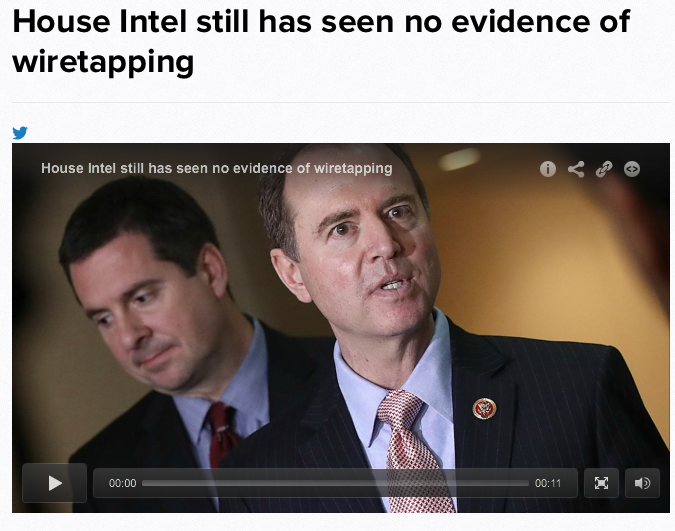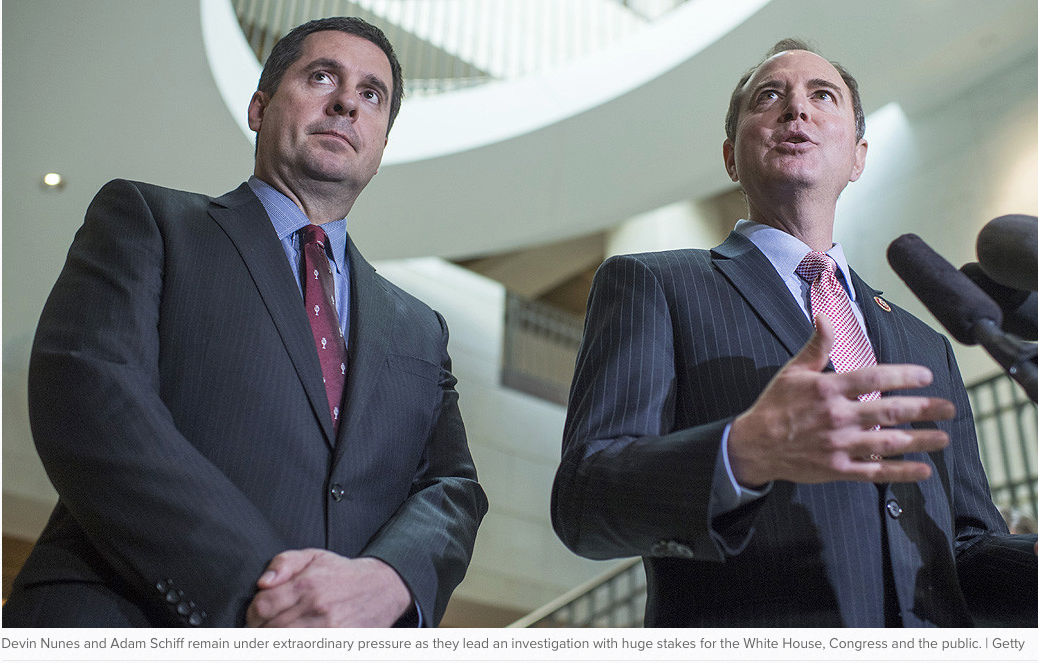Adam Schiff says Russia’s effort to sway the election for President Donald Trump is one of the most serious issues of our time. Devin Nunes isn’t even convinced Russia tried to help Trump.
As Nunes and Schiff, the Republican chairman and top Democrat on the House Intelligence Committee, lead the House investigation into Russia’s meddling in the 2016 presidential election, it’s unclear how two lawmakers with diametrically opposed approaches will handle the most politically sensitive investigation to hit Capitol Hill in decades.
Their clashing perspectives on the Russia matter could have severe consequences if Nunes and Schiff are unable to come to terms at key junctures of the probe. Schiff has already signaled he would be prepared to disavow the intelligence panel’s work if he feels Republicans are protecting sacred cows — a split that would undermine public confidence that Russia’s election interference has been fully explained and won’t be allowed to happen again.
The divergence has already burst into the public. After Nunes, a close Trump ally and member of the president’s transition team executive committee, said last month that he had seen no evidence tying Trump officials to Moscow, he drew a swift rebuke from Schiff for appearing to prejudge the outcome of their probe.
“When you begin an investigation, you don’t begin by stating what you believe to be the conclusion,” Schiff said. 
Since then, Nunes and Schiff have managed to forge some bipartisan agreements on how to proceed. But they remain under extraordinary pressure as they lead an investigation with huge stakes for the White House, Congress and the public.
“They seem to be eventually on a collision course, but they’re trying to make it work,” said one member of the Intelligence Committee who spoke on the condition of not being identified. “Devin is being torn between two roles, his role as a Trump transition adviser and his role leading a bipartisan investigation.”
The two Californians are something of an odd couple.
The combative Nunes is a conservative warrior and defense hawk who was talking about destroying “radical Islam” well before the rise of Trump and once referred to fellow Republican Justin Amash as “Al Qaeda’s best friend in the Congress.” The soft-spoken Schiff, extremely careful with his words, is a former federal prosecutor who rose to prominence in 1990 for the conviction of an FBI agent accused of passing secrets to the Soviet Union.
But they also insist they’re determined to make it work.
“This committee is very bipartisan in nature — it long has had a history of that, and that will continue,” Nunes told reporters last week.
Still, there have already been hiccups.
Nunes, for instance, agreed last month to a White House request to speak to a reporter to rebut allegations in the media that there were frequent contacts during the campaign between Trump aides and Russian officials, something Nunes says he’s seen no evidence of.
His willingness to run interference for the White House was immediately criticized by Democrats. Then came the dueling news conferences, where Schiff took aim at Nunes’ comments appearing to preemptively exonerate Trump.
Nunes also says he’s unconvinced by the basic conclusion reached by the U.S. intelligence community and released in a public report in January — that Russia sought to help Trump in the election.
“I don’t believe that to be the case,” Nunes said when pressed on the issue. “I don’t think the evidence exists for that. But we are going to do our investigation, and we will figure out if there is any intelligence or evidence that suggests that in fact that is the case.”
Schiff declined in an interview to criticize his Republican counterpart’s answer. And he said that the Intelligence Committee has made significant progress so far, including establishing a bipartisan agreement on the scope of its Russia probe and on the witness list for their first public hearing, set for later this month. But he noted there are major hurdles ahead — including whether Nunes will agree to subpoena witnesses who refuse to testify willingly.
An “inflection point will come when we need to compel people to come to the committee and whether we can get bipartisan agreement on that,” Schiff said. “That’s often where the rubber hits the road in an investigation.”
Rep. Jim Himes, a Democrat on the committee, said “there’s a big difference” between the internal cooperation between Republicans and Democrats on the panel and the outside rhetoric.
“On the inside, we’ve seen a lot of cooperation,” Himes said. “Outside, obviously, the rhetoric is very different and concerning.” 
The Connecticut congressman added that while he admires Nunes, “I think he’s said some things that raise questions about objectivity.”
Both Schiff and Nunes were heavily involved in House investigations into the 2012 Benghazi attack, probes that were eventually turned over to a select committee that was plagued by partisan bickering and produced separate Republican and Democratic reports. Schiff said he hopes to avoid a repeat.
“At the end of the day, if we end up with two reports, we will have added no value,” he explained. “The only way our investigation will have credibility is if we can reach a common conclusion at the end of the day on the core issues.” CLICK IMAGE BELOW for link to video.
He added, though, that if it gets “to the point at any time where I feel we can’t do that, where there are legitimate lines of investigation that are being walled off, then I will say so” — a warning shot to Nunes and other Republicans that Democrats are prepared to walk if their demands are not met.
Republican leaders also are hoping to avoid that outcome, as it would bolster the case for a select committee or independent commission to investigate Russia’s election involvement — something many Democrats and a few Republicans have called for. Taking the investigation outside the House and Senate intelligence panels would give GOP leaders far less control over the process.
Already, the House investigation is raising some serious questions. Both Nunes and Schiff agree that, if news reports are accurate, the FBI may have withheld significant information last year from the so-called Gang of Eight, which consists of the congressional leaders in both chambers plus the top Republicans and Democrats on the intelligence panels.
These eight lawmakers are supposed to be informed of sensitive counterintelligence investigations. Nunes, though, has indicated they were not told last year about any probes into Trump campaign aides, despite media reports suggesting Trump officials came under scrutiny from intelligence agencies for alleged communications with Russians.
“If Trump or any other political campaign, anybody associated with Trump, was under some kind of investigation, that clearly should have risen to the Gang of Eight level,” Nunes told reporters. “Clearly we have some questions about whether or not last year we were read into everything that we should have been read into.”
Schiff concurred: “As a member of the Gang of Eight, we have not been provided the full information that I think we need.”
The two congressmen are now preparing for their first public hearing March 20, having agreed on an invite list that includes former CIA Director John Brennan, former Director of National Intelligence James Clapper and former acting Attorney General Sally Yates, all of whom served during the administration of President Barack Obama. Yates was fired by Trump in January after refusing to defend his travel ban executive order in court. They are being asked to testify willingly, and Nunes said he had no plans yet to issue subpoenas.
“This hearing will be designed to collect evidence in public,” Nunes said. “We hope the testimony will lead to more questions and more witnesses.”
Connor O’Brien contributed to this report.



You must be logged in to post a comment Login